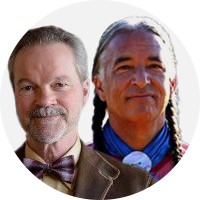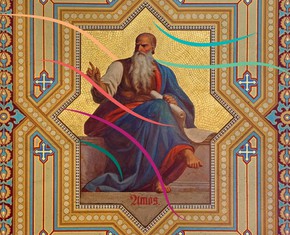The views expressed in our content reflect individual perspectives and do not represent the authoritative views of the Baha'i Faith.
In this installment of our continuing series on Indigenous messengers of God, Kevin Locke and Chris Buck tackle the difficult issue of cultural appropriation and Indigenous peoples.
Q: Kevin, I knew this was coming. Offline, we’ve been criticized – and commended – for what we have written online about Indigenous messengers of God. One criticism: that we’ve failed to follow Indigenous protocols, to learn from elders who are the preservers and transmitters of sacred Indigenous knowledge, and to ask for and receive their permission to share some of their sacred traditions. Have we, in the past, tried to do so, in a good faith effort?
A: Yes Chris, this is a very sensitive topic! Especially in view of the fact that the Indigenous peoples — and the legacy of our holy messengers’ sacred teachings and traditions — have undergone centuries of colonial, physical, and cultural genocide, condemnation, vilification, etc. Despite the profound spirituality of their teachings, they have been suppressed, persecuted and slandered:
All the holy ones of God have tried with heart and soul to spread the light of love and unity throughout the world, so that the darkness of materiality might disappear and the light of spirituality might shine forth among the children of men. Then would hate, slander and murder disappear, and in their stead love, unity and peace would reign.
All the Manifestations of God came with the same purpose, and they have all sought to lead men into the paths of virtue. Yet we, their servants, still dispute among ourselves! Why is it thus? Why do we not love one another and live in unity?
It is because we have shut our eyes to the underlying principle of all religions, that God is one, that He is the Father of us all, that we are all immersed in the ocean of His mercy and sheltered and protected by His loving care. – Abdu’l-Baha, Paris Talks.
But thankfully, things have changed. We now live in a time of a sea-change, awakening to the importance of attuning ourselves to the rising Indigenous voices. The foundation of the efficacy and power of that collective voice are the universal spiritual principles deposited in the hearts of the ancestors through the very Indigenous messengers we describe in this series of articles.
The knowledge and significance of these divine messengers has been repressed for so long that the process of awakening to the power of their divine light sometimes seems slow and painful. In my own Lakota tradition, I have witnessed that dynamic firsthand.
Q: What are some of the problems and challenges in doing so?
A: It would be difficult, if not impossible to attempt to follow the various tribal protocols for each and every Indigenous messenger of God whom we present in this series.
Fortunately, previous generations have left much to posterity with their precious, authentic insights. Chief John Arthur Gibson of the Haudenosaunee is perhaps the best example, when, in 1912 — just months before his death later that same year — he recited the epic saga and “The Great Law” of Deganawida, the Peacemaker.
When famed ethnomusicologist Frances Densmore came to Standing Rock in 1911, she made no progress until a consultative body of eminent elders commandeered her research by insisting that, since all light and reality is attributed to the messenger – Ptehíŋčala Ska Wiŋ, White Buffalo Calf Woman — an account of her appearance and legacy must precede all else. Fortunately we have pioneering examples such as these on which to base our articles.
Q: Good point! It’s clear that you’re referring to books like Concerning the League: The Iroquois League Tradition as Dictated in Onondaga by John Arthur Gibson, the winner of the 1994 SSILA Book Award; and also to Teton Sioux Music, by Frances Densmore. I’d like to now ask you if you agree that, in a sense, “advance permission” has been given if an Indigenous faith-keeper, or elder, had previously given sacred indigenous knowledge to someone, like an anthropologist, for publication. Can that be considered “advance permission”?
A: Many of the aforementioned informants explicitly stated that their motive was to benefit future unborn generations. Today we’re blessed to live in these times, when we can bring this knowledge to fruition.
Q: Another source of information that we’ve sometimes used is information provided by various First Nations online. Would you agree that there is another source of “advance permission”?
A: The most important point here is intent. What is our goal? I’ll cite some of my thoughts on this issue from my book, Arising:
In 1993, my mom was elected to serve on the National Spiritual Assembly of the Baha’is of the United States. … I learned much from my mother, as a part of her everyday discourse, about sharing the teachings of the Baha’i Faith in the most natural way. Teaching as a part of her everyday life was a manifestation of her generosity and magnanimity. Without any airs and in numerous settings, whether in a public talk or on a visit to a friend’s home, she mentioned Baha’u’llah and shared passages from The Hidden Words. Her favorite point of conversation was progressive revelation – that God has revealed Himself to mankind throughout time in the form of spiritual teachers who have brought to us religious laws and teachings suited for the time in which we live. She loved the quote:
Unto the cities of all nations He hath sent His Messengers, Whom He hath commissioned to announce unto men tidings of the Paradise of His good pleasure, and to draw them nigh unto the Haven of abiding security, the Seat of eternal holiness and transcendent glory. – Baha’u’llah, Gleanings from the Writings of Baha’u’llah.
… I had come to understand that God had not forsaken us and had sent a great message through Baha’u’llah to connect the Lakota spiritual traditions with the other great world religions. The White Buffalo Calf Maiden is not directly mentioned in the Baha’i writings, as Abraham, Zoroaster, Buddha, Moses, Jesus, and Muhammad are. The Baha’i writings further clarify that the names of some Prophets “seem to be lost in the mists of ancient history.” – Letter written on behalf of Shoghi Effendi, October 4, 1950, to an individual Baha’i.
My growing understanding of Baha’i teachings did not undermine Lakota spiritual traditions. Rather, the Lakota ceremonial life and the practices I cherished so dearly were given new meaning, and I did not have to abandon my background but could appreciate the gems within it more fully.
For the first time, in the Baha’i Faith, I had direct and lucid answers to many of my questions. I sensed that my search for meaning – for the red road – was not over, however; it was beginning afresh every day. – Kevin Locke, Arising, pp. 227-274.
Q: I see that in the Introduction to your excellent book, that Kenneth E. Bowers, Secretary of the National Spiritual Assembly of the Baha’is of the United States — although writing as an individual — states, in much the same vein, and with the same quote from Baha’u’llah that your mother loved so much.
Baha’is believe that Baha’u’llah is the latest in a series of Messengers of God to humanity Who have guided our spiritual and social evolution down through the ages. The Messengers are part of one divine plan, the ultimate goal of which is the unification of the entire world and the creation of a new civilization based upon the principles of divine justice. Baha’u’llah taught respect for the spiritual heritage of the entire human race, in all its vastness and diversity. He stated categorically that no nation or people have been deprived by the all-loving Creator of their share of divine knowledge and that none are to be condemned or disdained:
Unto the cities of all nations He hath sent His Messengers, Whom He hath commissioned to announce unto men tidings of the Paradise of His good pleasure, and to draw them nigh unto the Haven of abiding security, the Seat of eternal holiness and transcendent glory. – Baha’u’llah, Gleanings from the Writings of Baha’u’llah.
Kevin found in this message a welcome contrast to the demands from various quarters to reject the beliefs of his ancestors. For the first time, he was able to link his ancestors to the history of humanity’s encounter with God in all its forms. Virtually all cultures revere certain great spiritual visionaries whose teachings have provided the moral foundations for their respective societies. Baha’u’llah, Who lived in the Middle East in the nineteenth century, mentioned some of these Messengers by name, especially those known to the people of His place and time. Given the vast number of tribes and nations in the world, He did not specifically name all those sent by God for the spiritual education of His children.
Yet a person of any particular background might well consider certain souls to have been among such spiritual teachers. White Buffalo Calf Maiden, for example, figures prominently in Lakota tradition and was a source of inspiration and guidance in Kevin’s life. She ranks in his heart among these great spiritual luminaries. – Kenneth E. Bowers, in the Introduction to Kevin Locke’s Arising, p. xiv.
















Comments
Sign in or create an account
Continue with Googleor